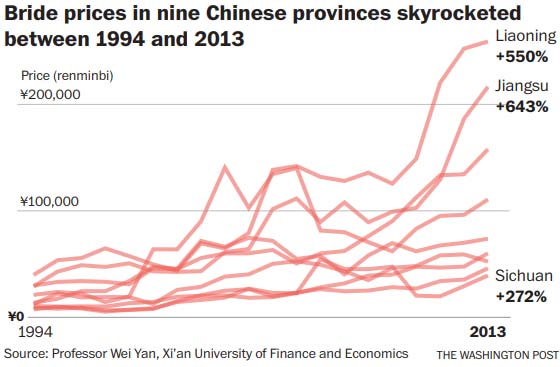
The going rate was about $38,000, or five times the average annual salary in this village about a four-hour drive north of Beijing. Now, families were told to keep it below $2,900.
Anything more and they would risk being accused of human trafficking.
The "bride price" - cash, and possibly a house or other goodies to the bride-to-be's parents - has been part of the marriage pact in most of China for centuries. The costs, though, are swelling as China copes with one of the biggest demographic imbalances in history.
One part of it has been long known: How China's former one-child policy left a glut of boys - preferred by most Chinese families. Girls were sometimes aborted, killed after birth or simply left in a bureaucratic limbo as not registered with authorities before the one-child rule was eased in 2016.
There are an estimated 30 million or so more men then women in China - giving it one of the most lopsided ratios in the world.
But China's economic expansion in the past decade has taken a further gender bite out of rural areas.
Many teenage girls leave to pursue education or better-paying work in cities. Most do not come back to places like Da'anliu, a small village where most people make money harvesting pears or working in a handful of small factories.
So officials in Da'anliu and other villages have taken matters into their own hands on one thing they can control: the bride price.
They want local marriages and the local children they could produce. Yet the high cost of dowries stands in the way.
The twist, however, is that the well-meaning efforts can split villages.
The controls are good if you have a son. Not so good for families with a daughter.
Ask Liang, a pear farmer in Da'anliu. He has one daughter. When it comes time for her to marry, "I will ask whatever amount I want," he said. "It's not fair otherwise."
It wasn't really about the money, he claimed. He planned to give the bride price to his daughter anyway, once she started her family. It was the principle of the thing for Liang, who asked that only the one name be used in his discussion of a sensitive family issue.
"It's the market," he said. "I'm allowed to charge what the market will bear for my pears. Why not my daughter?"
"In the rural areas, the amount of bride price may equal up to dozens time of the annual net income," Quanbao Jiang, a professor of demography at Xi'an Jiaotong University, wrote in an email.
That has the effect of draining resources and limiting a family's ability to care for the elderly or the young. Is also has left men from impoverished areas without any hope of finding a mate.
The Da'anliu Communist Party secretary, Liang Huabin, has seen the way families scrimp and save and panic over the bride price. They say "it's tough to manage," he said, especially since the pear harvest has been bad the past few years.
He was not sure what to do about it until one of his constituents sent him a picture of a bride price limit instituted in a village in China's southern Hunan region. He decided to try something similar.
Liang knows the village cannot do much to enforce the rule. But he hopes people will eventually adjust their thinking. "It will be difficult to really have an impact immediately," he said. "But gradually it will sink in."
He has two young granddaughters, he said. When it comes time for them to marry, "I'll encourage their parents to ask for a reasonable price," he said.
He acknowledged there is little else he can do.
Licun Tan, 39, should be thrilled about Liang's effort.
Licun runs a small bodega out of her home. She has a 16-year-old son, who she will try to marry off in a couple of years after he graduates from high school and works a bit.
She's already stressed about saving for the bride price. She opened a second store to bring in extra money. And her husband works, too. But she's not sure it will be enough.
At the same time, she can't imagine abiding by a limit. There simply aren't enough women around.
"The rule is the rule, but who will follow it?" she said. "If I followed it, the result would be no girls to marry."
Wang Feng, a sociologist who studies Chinese demography at the University of California at Irvine, said there is incredible social pressure for families to help arrange perceived "good marriages" for their sons.
People would find ways around any regulation - even limits on bride price.
"It's trying to cure a symptom, not the root issue," he said.
(COMMENT, BELOW)


 Contact The Editor
Contact The Editor
 Articles By This Author
Articles By This Author